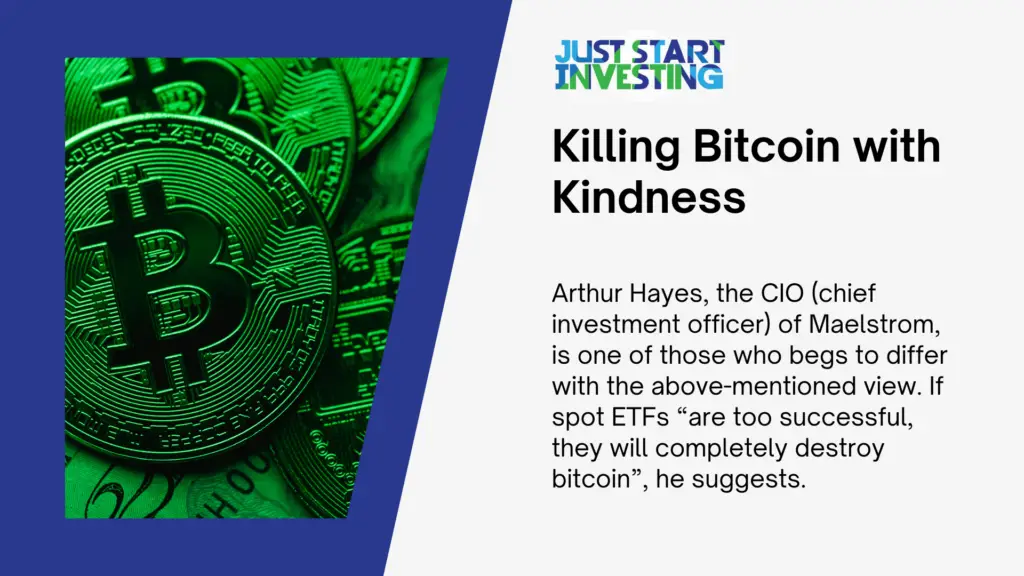Some people have been saying that an SEC approval of spot bitcoin ETF applications would inject the token’s prices with steroids. Others, like Kraken’s Thomas Perfumo, have their eye on the overall enrichment the sector would gain from institutional interest. As Perfumo sees it, there are “40 trillion or so of retirement assets in the US that currently don’t have a very intuitive means of investing in crypto”, which are just waiting to gush in when the floodgates are opened.
Indeed, it seemed a lot was riding on whether or not the SEC would give the green light when, four days into the new year, bitcoin prices shuddered at the thought of a red light appearing. The token sunk 9.2% on the news that Matrixport believed all ETF applications would be rejected. “The market is keenly focused on the potential for an ETF approval, so even small whiffs of news can cause relatively big market moves”, explained Matthew Hougan of Bitwise Asset Management.
However, even in a world in which the SEC gives the thumbs up, it’s not at all clear how much upside will come to token prices as a result. Much of the 172% gains bitcoin has already clocked up in the past year were premised on SEC approval in early 2024, so the event itself could fall flat. Knowing this, many traders may use the approval as an opportunity to cash in on their bitcoin and this, of course, would actually drag prices down. K33 Research, for one, “don’t expect mega immediate inflows to the ETFs”. CryptoQuant believe SEC approval would spark a bitcoin price crash down to $32,000.
The longer-term bullish viewpoint is based on the presumption that, in the event the bitcoin ETF became a reality, fund managers would purchase billions of dollars’ worth of bitcoin, which would then bolster demand forces against supply, thus propping up prices. Is this scenario fairly certain, or do some important analysts see things differently?
Killing Bitcoin with Kindness

Arthur Hayes, the CIO (chief investment officer) of Maelstrom, is one of those who begs to differ with the above-mentioned view. If spot ETFs “are too successful, they will completely destroy bitcoin”, he suggests. Hayes is imagining a future in which asset managers like BlackRock consume all the available bitcoin with the use of their healthy bank balances, which would slow blockchain transactions to a snail’s pace. Following this, bitcoin miners (who secure network transactions for a fee) would lose incentive to continue with their work. “As a result,”, says Hayes, “they would shut off their machines. Without the miners, the network dies and bitcoin vanishes”. Here we have a scenario quite different to the one envisioned by Perfumo, and yes, we should take it into consideration, especially since we’ve seen dazzling crypto dreams dashed before now.
Fresh Inflows?
Returning to Perfumo’s point about the “40 trillion or so” of assets just waiting for the safety and convenience of a spot bitcoin ETF, JP Morgan see things differently and here’s why: For a start, if we look at the spot ETFs that already exist in Canada and Europe, we see that the floodgates were not, in fact, overwhelmed by institutional interest once approval came. Secondly, even if lots of cash comes into the ETFs, it may simply be channeled out of existing funds like bitcoin futures ETFs. There is reason to wonder, then, whether the cascades of money we could see flowing into spot bitcoin ETFs would really originate in the same old assets pools that were sitting around before. As to the token-price upside expected by some people from the bitcoin halving event coming up in a few months, this is “largely priced in” already, says JP Morgan.
The Landscape Ahead
Setting our sights a little bit closer, onto March 2024, Hayes foresees a plummet in equities which will bring down bitcoin together with them. He warns us to brace for a “liquidity rug pull” that will spark “a vicious washout of all the crypto tourists”.
A final point that should be made is that the other key premise, aside from SEC approval, underlying last year’s crypto bonanza was anticipated dovishness on the part of the Fed. The problem is that stock traders in the first week of this year seemed to have second thoughts on that very point. “Crypto prices would wobble”, warn Bloomberg, “if investors continue to pare back expectation of looser monetary policy”.
Using the sleek, powerful iFOREX Europe trading platform, you can trade in the short-term movements of crypto prices, irrespective of which direction they’re going. Visit their website to see the extensive list of other CFD instruments you can trade on the popular platform.
iFOREX Europe (formerly known as ‘Vestle’) is the trading name of iCFD Limited, licensed and regulated by the Cyprus Securities and Exchange Commission (CySEC) under license # 143/11. The materials contained on this document have been created in cooperation with iFOREX Europe and should not in any way be construed, either explicitly or implicitly, directly or indirectly, as investment advice, recommendation or suggestion of an investment strategy with respect to a financial instrument, in any manner whatsoever. CFDs are complex instruments and come with a high risk of losing money rapidly due to leverage. 74.08% of retail investor accounts lose money when trading CFDs with this provider. You should consider whether you understand how CFDs work and whether you can afford to take the high risk of losing your money. Any indication of past performance or simulated past performance included in this document is not a reliable indicator of future results. Please note: Calculations of past performance movements may represent the futures and not the underlying asset. Full disclaimer: https://www.iforex.eu/legal/analysis-disclaimer.html

Just Start Investing is a personal finance website that makes investing easy. Learn the simple strategies to start investing today, as well as ways to optimize your credit cards, banking, and budget. Just Start Investing has been featured on Business Insider, Forbes, and US News & World Report, among other major publications for its easy-to-follow writing.

